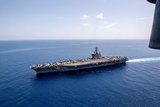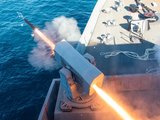Royal Navy looks to OPV dry dock activities in Asia-Pacific
HMS Spey in Sembawang, Singapore. (Photo: Chen Chuanren)
The UK Royal Navy is planning to conduct dry dock servicing for its Batch 2 River-class HMS Spey and HMS Tamar in the Asia-Pacific region marking a first for the service. The development has come at a time when the Royal Navy is seeking to maintain a persistent presence while expanding its logistics footprint and network in the region.
The two Offshore Patrol Vessels (OPVs) were deployed to Indo-Pacific in September 2021. Commanding officer of HMS Spey, Commander Paul Caddy, told Shephard that the vessel was now looking to conduct its five-year dry dock servicing in the region and
Already have an account? Log in
Want to keep reading this article?
More from Naval Warfare
-
![Raytheon will develop an advanced naval sensing and targeting system for DARPA]()
Raytheon will develop an advanced naval sensing and targeting system for DARPA
RTX’s solution for DARPA’s Pulling Guard programme is intended to provide advanced maritime defence technologies to protect platforms against uncrewed surface vehicles and other threats.
-
![Spain’s F100 upgrade mirrors Aegis modernisation paths in allied navies]()
Spain’s F100 upgrade mirrors Aegis modernisation paths in allied navies
The Spanish Navy’s Alvaro de Bazan-class of air defence frigates will receive the latest Aegis Weapon System technology among other modernisations to extend the service life to 2045.
-
![UK’s Fleet Solid Support ship programme deemed on track despite steel supply concerns]()
UK’s Fleet Solid Support ship programme deemed on track despite steel supply concerns
Shipbuilders are saying the programme is going ahead on time as the government estimates 7.7 million tonnes of steel are needed for 2026 infrastructure projects.
-
![Raytheon unveils details of its proposal for the US Navy/NATO ESSM Next Significant Variant]()
Raytheon unveils details of its proposal for the US Navy/NATO ESSM Next Significant Variant
In an exclusive interview with Shephard, Raytheon’s VP of Shipboard Missiles disclosed what improvements the company plans to offer for the Sea Sparrow NSV.






















